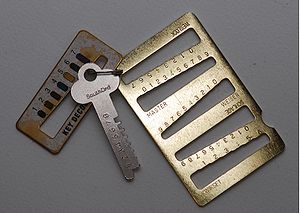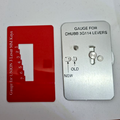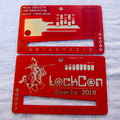Key gauges
Key Gauge
A key gauge is a locksmithing tool used to decode the cut depths of a key. Key gauges are commonly used for key duplication, decoding, and creation of bump keys.
Styles of Key Gauges
Key gauges come in various sizes and can often have more than one set of depth information on one gauge.
The most common type of key gauge is used to decode keys to determine the bitting. These usually consist of an angled slope, or stepped slope, indicating depth.
Another form is used for decoding, and also creating keys. By adding a set of spacing markers on an edge of the gauge, a key can be cut to code with nothing more than the key gauge and the skilled usage of an impressioning file.
Universal Lever/warded Lock Key Gauges
These are used to determine the outside gauge (on a pin key or blank) or the inside gauge (on a pipe key or blank) to fit over the drillpin.
The posts are stepped to reduce the size and weight of the gauge.
Specific Lever Lock Key Gauges
Lever locks are well suited to be measured and their bitting code determined with a key gauge. The difference in height between successive bitings is clearly visible with the eye. Double and single bitted lever lock keys can be measured in this way. In use the key is placed on the gauge and each bitting is visually decoded by matching it against the appropriate line. Keys can be read or decoded quickly and accurately.
Electronic Key Gauges
Add to me!
Gallery
Key gauge for Mul-T-Lock telescoping pins.
See also
| This article is a stub. You can help Lockwiki by expanding it. |





